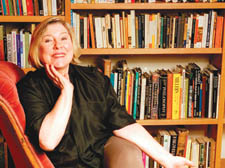|
|
 |
| |
 Fay Weldon Fay Weldon |
Fay’s slice of futuristic National Meatloaf
Fay Weldon’s latest novel is set in Primrose Hill, in a grim world just four years away from our own, writes Gerald Isaaman
Chalcot Crescent. By Fay Weldon.
Corvus £16.99
DON'T put your head under the blankets when those Tory bogeymen Dave Cameron and his young sidekick George come on the box, threatening wage freezes, pension delays and tax increases.
They haven’t a clue about what life in our debt-ridden land is going to be like in the years ahead.
If you truly want to know the truth, then read Fay Weldon’s futuristic new novel, set in 2013 in Primrose Hill. It is a saga that has more than a touch of the dictatorship doctrine of Orwell’s 1984 about it.
The National Unity Government, otherwise NUG, made up of sociologists and therapists rather than politicians, is strictly in the style of Big Brother following the crippling crash of capitalism and the rotten recession that followed.
Essential services like electricity and water are rationed in Fay’s version of broken Britain but somehow her characters manage to survive on highly nutritional National Meat Loaf, produced by the National Institute for Food Excellence, otherwise NIFE.
And there is revolution in the air, one angry character joining Redpeace because “he lost his Porsche and his string of girlfriends. He blames the bankers of the past…and their kind for setting up a universal Ponzi scheme knowing very well what they were doing”.
Fay is obviously having fun, the more so since she once lived in Chalcot Crescent. Yet it is not our Fay who, as the story unfolds, is hiding from the Clockwork Orange bailiffs because she is behind with the dreaded mortgage. It is her alter ego Frances, the little stillborn sister she never had, who, now a remarkable 80, takes unreliable command of events in a world where “the bankers serve very well as scapegoats, but what can they do if the world turns out to be bipolar; if one day the sunspots flare again, the polarity reverse, the nations of the world shut up shop?”
Anyone who has read Auto Da Fay, Fay Weldon’s autobiography of love and lust in and around NW3, will recognise huge chunks from her own dysfunctional past in this novel, Fay’s 29th no less.
Her dazzling skill in mixing her personal facts with creative fiction provides its own frolics in what is a mish-mash of eclectic fantasy. In fact her usual publishers turned down the novel, not that it worried Fay. Given her reputation as the author of The Life and Loves of a She-Devil, she just marched off elsewhere with her dotty plot of insurrection on the slopes of Muswell Hill.
And why not? We need some distraction from the gloom and, after all, HG Wells set the final scenes from The War of the Worlds on Primrose Hill. Maybe Fay was infected during her years in the Crescent by one of those deadly canisters dropped by UFOs on a dark night when the animals at the zoo were asleep.
She plunders her own past to the extent that her former husband, local antiques dealer Ron Bateman, now becomes Frances’ lover, named Karl. That obviously fits in with the fact the old home of Marx’s friend Engels is just round the corner from the Crescent, making it an appropriate setting for political intrigue and coups.
She even manages to work in a reference to the celebrated Booker Prize for Fiction (Fay, having once been the controversial chairman of the judges when Salman Rushdie failed to win the prize for a second time); and her own comparatively recent return to prayer in the church.
Indeed, the story is made all the more frustrating by Fay forever showing off her erudition, pungent wit and the frivolous wisdom you might expect from the former advertising copywriter responsible for the slogans “Go to Work on an Egg” and “Unzip a Banana”. If anything, it unzips her own past, Fay, now 78, insisting that she really isn’t the truculent feminist icon once heralded in the headlines, now declaring that washing your husband’s discarded socks ought to be a wife’s priority duty.
She is on record as declaring: “I didn’t even know I was feminist until I read it on the back of one of my books. I thought I was writing novels about what I saw and thought. I certainly wasn’t writing intentional propaganda.”
She confesses too that she never meant to be a writer. “I just wanted to be a wife and a mother. Or actually I think I just wanted to have a proper love life. That was my only ambition…Well, by love life I mean sex life, I suppose.”
Life without libido would indeed be boring, but you might have thought that Fay had grown up by now.
Her novel has the merit that it tackles the decadence of today rather than that of past centuries. Yet it all ends in misery in the final battle of Muswell Hill.
“There was a moment when they could have taken over the hoses and gassed the enemy rather than themselves,” she writes. “But the moment was lost. The New Model Army of the New Republic limped down the hill again, boots splashing in vomit.”
Ugh!
|
 |
|
|
 |
 |
|
 |
|
 Fay Weldon
Fay Weldon 
